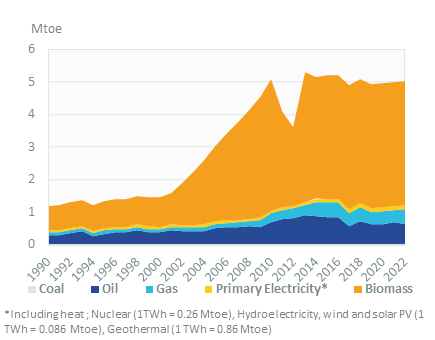-
-
 Energy and Climate Databases
Energy and Climate Databases- The most comprehensive and up-to-date annual energy database.
- Monitoring of technology providers in H2 supply chain.
- Monthly energy data on key energy markets.
- The most reliable and up-to-date power generation database.
- The essentials of LNG trade at your fingertips.
- Global monitoring of new and existing refineries.
- Analyse energy consumption and efficiency trends at world level. Benchmark countries.
- Have your database developed by a recognised expert of both energy and IT.
-
 Energy - Climate Forecasts
Energy - Climate Forecasts- Instant access to energy and emissions forecasts.
- Strategic, annual wholesale price projections backed by Enerdata's energy modelling expertise and our globally recognised POLES model.
- Wedges module showing a breakdown of the levers enabling to reduce emissions between two scenarios.
- Unique, independent projections of consumption by end-use.
- GHG Marginal Abatement Cost Curves.
- Benefit from proven models to draw your own energy scenarios and anticipate tomorrow’s challenges.
-
 Market Intelligence
Market Intelligence- 110 Energy and climate country reports
- A newsletter to receive the latest updates on evolving technologies and policies.
- Global energy news and analyses curated daily.
- Enerdata’s experts bring you the essentials about your market and competitors.
-
-
-
 Market Analysis
Market Analysis- Understanding key consumption trends and drivers across sectors.
- Granular and exclusive insight to address the most pressing business and strategic issues.
- Expertise in strategic and business intelligence, with fine-tuning to the market’s specificities.
-
 Energy - Climate Scenarios
Energy - Climate Scenarios- Providing the outlook of an energy commodity in mid to long term time horizons.
- Sector and driver specific energy demand forecasting.
- Assess the evolution of energy prices on the international and regional markets, as well as end-users prices.
- Enerdata guides you through pathways to reach climate targets.
- Supporting local authorities in their decarbonisation strategies.
-
 Climate Strategy and Policy Evaluation
Climate Strategy and Policy Evaluation- Cutting-edge quantitative tools and relevant indicators to monitor and evaluate evolutions on worldwide energy markets.
- Analysis of the most cost-effective options to reduce emissions.
- Quantified simulation and analysis of pledges for climate change negotiations.
- Breakdown and analysis of carbon markets.
- Enerdata guides you on the most beneficial policy or investment options.
- Turning climate objectives into concrete action plans.
-
 Training
Training- Understand different policy targets and measures on energy efficiency.
- How to measure energy savings?
- Energy Forecasting is a 2 days training to learn to design and interpret energy forecasts.
- Energy statistics training allowing to create energy balance with supply, transformation and consumption and understanding the international energy statistics regulations.
- Initiation to EnerMED level 1is the training to approach on the most powerful energy demand forecasting model.
-
-
Resource Centre
Gabon Key Figures
- Population:
- 2.39 million
- GDP growth rate:
- 3.04 %/year
- Energy independence:
- 100%
Data of the last year available: 2022
- Total consumption/GDP:*
- 109 (2005=100)
- CO2 Emissions:
- 0.98 tCO2/capita
- Rate of T&D power losses:
- 15.6%
* at purchasing power parity
View all macro and energy indicators in the Gabon energy report
Gabon Related News
View all news, archive your new and create your own daily newsletters only on your topics/countries of interest with Key Energy Intelligence
Gabon Related Research
Benefit from up to 2 000 up-to-date data series for 186 countries in Global Energy & CO2 data
A data overview is available in the global energy statistics app
Total Energy Consumption
Primary energy consumption per capita is around 2.1 toe, including almost 1 100 kWh of electricity (2022).
Graph: CONSUMPTION TRENDS BY ENERGY SOURCE (Mtoe)

Total consumption has remained quite stable since 2014 at around 5 Mtoe (5 Mtoe in 2022), after a rapid increase between 2000 and 2010 (13%/year, i.e. a 3.5-fold rise).
Biomass (wood, waste) covered 76% of the country's needs in 2022, followed by oil (13%), gas (9%), and hydroelectricity (3%).
Interactive Chart Gabon Total Energy Consumption
Benefit from up to 2 000 up-to-date data series for 186 countries in Global Energy & CO2 data
View the detailed fondamentals of the market at country level (graphs, tables, analysis) in the Gabon energy report
Crude Oil Production
Oil production rose again by around 3% in 2022 to 10.4 Mt, following a sharp drop in 2021 (-7%) and a progression since 2018 thanks to the exploitation of recent discoveries and the effort of companies specialized in maximizing the value of mature fields. Oil production is mainly offshore (81% of the total area). Previously, the country had recorded a 25% decrease in production over 2010-2018 (-3%/year) and 30% drop between 1997 and 2002, due to the falling production of the main fields and the decline in reserves.
Interactive Chart Gabon Crude Oil Production
Benefit from up to 2 000 up-to-date data series for 186 countries in Global Energy & CO2 data
Additionally, for more detailed information on refineries, you can request a sample of our EMEA Refineries Dataset
CO2 Fuel Combustion/CO2 Emissions
In its NDC (2016), Gabon set the commitment to reduce its GHG emissions by at least 50% in 2025 as compared to a BAU scenario, including LULUCF (Land Use, Land-Use Change and Forestry), which accounts for more than 60% of direct emissions, but excluding carbon stocks in forests (i.e. sinks). The expected emissions reduction should reach 62% in 2025 (LULUCF included) vs BAU scenario. In its revised NDC (2022), the country committed unconditionally to remain carbon neutral in 2050 and to pursue a minimum net absorption of 100 Mt of CO2 annually.